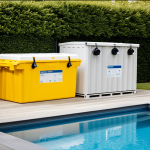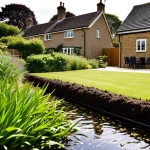Essential Eco-Friendly Practices for Pool Drainage in the UK
When managing sustainable pool drainage, UK homeowners must prioritise eco-friendly techniques that both minimise water waste and protect local ecosystems. The core principle is to ensure pool water is drained in a way that mitigates environmental impact. This means avoiding direct discharge into storm drains or sensitive areas where chemicals could harm wildlife or contaminate groundwater.
Minimising water waste starts with assessing water quality before drainage. Reducing chlorine or other chemical levels through natural treatment or dilution helps prevent contamination during discharge. Homeowners can take immediate action by directing drained water onto lawns or permeable surfaces where it can safely soak into the ground, supporting the local vegetation without flooding.
Have you seen this : Ultimate guide to safe pool chemical storage for uk homeowners: must-know tips
Using simple tools like pumps with flow control, and timing drainage during dry weather to prevent runoff, further enhances sustainability. These eco-friendly techniques are vital because they align with responsible water management and contribute to broader environmental conservation efforts. Embracing sustainable pool drainage practices is not only a regulatory priority but also a step towards greener homeownership in the UK.
Understanding UK Pool Drainage Regulations and Legal Considerations
Navigating UK pool drainage laws is essential for every pool owner aiming for sustainable pool drainage. UK environmental regulations strictly govern how pool water can be discharged to prevent local contamination. Most councils prohibit drainage into storm drains or sewers without prior treatment because pool water often contains chemicals harmful to aquatic life. Violating these rules can lead to fines or enforcement actions.
Also read : Transform your uk swimming pool: discover how aquatic plants boost water quality
Permissible drainage methods typically allow releasing water onto permeable ground or gardens, where natural filtration reduces chemical impact. For example, directing diluted, dechlorinated water onto lawn areas aligns with these environmental regulations. On the other hand, directly draining chlorinated or chemically treated water into drains is strictly prohibited.
Contamination prevention hinges on understanding specific council requirements, which may vary across regions. It’s advisable for UK homeowners to consult local regulations before draining their pool. Penalties for improper disposal are significant, including fines and potential environmental cleanup costs. Thus, adhering to UK pool drainage laws not only protects local ecosystems but also ensures responsible, legal pool management.
Creative Water Reuse and Recycling Solutions
When considering water reuse for sustainable pool drainage, UK homeowners can embrace several creative tips that transform drained pool water into valuable resources. One practical approach is using pool water for garden irrigation. Since pool water contains nutrients beneficial for plants—once dechlorinated—it can nourish lawns and flowerbeds, reducing freshwater consumption.
Integrating pool water recycling into greywater systems offers an efficient, eco-friendly household solution. Greywater reuse involves channeling filtered pool water to flush toilets or water outdoor plants, cutting down overall water usage. However, effective on-site filtration is crucial to remove residual chemicals and particulates. Common methods include sand filters, activated carbon filters, and UV treatment, which ensure safe redistribution of water.
Creative pool water reuse not only conserves water but also helps minimise chemical discharge into the environment. UK homeowners should regularly test and treat pool water before repurposing it, aligning with sustainable pool drainage goals. Such techniques embody responsible water management and enhance environmental protection efforts, making pool water recycling a smart, eco-conscious choice.
Step-by-Step Guide to Sustainable Pool Drainage
Careful preparation is key for sustainable pool drainage that meets eco-friendly pool practices and the needs of UK homeowners. Begin by testing your pool water for chlorine and chemical levels. If high, reduce these with natural neutralising agents or allow time for chemical breakdown before draining. This step minimises environmental risks.
When ready, drain slowly onto a permeable surface like soil or lawn to control runoff and prevent contamination. Use a pump with flow control to help manage the water volume safely. Timing drainage during dry weather further reduces risks from surface water runoff mixing with pool water.
Post-drainage, clean and maintain your pool equipment carefully. Remove debris and check for leaks to keep your system efficient, lowering the need for frequent drainage and reducing water waste. Regular maintenance supports sustainable pool drainage by extending pool life and saving resources.
Following this step-by-step pool drainage guide enables UK homeowners to respect environmental guidelines while protecting local ecosystems and conserving valuable water supplies.
Product Recommendations for Eco-Conscious Pool Management
Choosing the right eco-friendly pool products is crucial for enhancing sustainable pool drainage and reducing environmental impact. For UK homeowners, efficient filtration systems such as sand filters and activated carbon filters stand out. These systems effectively remove chemicals and debris, ensuring cleaner water before drainage or reuse.
Environmentally friendly water treatment alternatives are also gaining popularity. Natural enzymes and mineral-based treatments provide effective sanitation without harsh chemicals, minimising contamination risks and aligning with eco-friendly techniques. These treatments are safer for wildlife and local water sources.
Innovative tools like digital monitors help track chemical levels in real time. Maintaining balanced water chemistry reduces unnecessary water waste and chemical discharge by prompting timely adjustments. Additionally, flow control pumps enable gradual drainage, preventing runoff and preserving the local ecosystem.
Utilising these eco-conscious products supports UK homeowners in achieving sustainable pool drainage by combining effectiveness with environmental responsibility. Selecting appropriate filtration and water treatment options ensures compliance with regulations and diminishes harmful discharge, creating a safer, greener pool environment.
Essential Eco-Friendly Practices for Pool Drainage in the UK
Balancing sustainable pool drainage with environmental responsibility is vital for UK homeowners. The foremost principle is to minimise water waste by draining pool water thoughtfully, avoiding direct discharge into storm drains or waterways. This reduces the risk of chemical contamination that can harm aquatic ecosystems.
Immediate steps include testing pool water for chemicals and neutralising chlorine before drainage. Using eco-friendly techniques such as draining onto permeable surfaces—lawns, garden beds, or gravel—allows water to soak naturally into the soil, supporting local vegetation while preventing runoff.
Slow controlled drainage with a pump equipped for flow control helps manage water volumes effectively, especially during dry periods when soil absorption is optimal. Avoiding drainage after heavy rain prevents excess runoff that could carry contaminants to drains.
Homeowners can also collect drained water temporarily to reuse for irrigation, further reducing waste. Adopting these eco-friendly techniques protects local water quality while promoting sustainable water use. Simple actions like these empower UK homeowners to contribute positively to their environment through conscious pool management.
Essential Eco-Friendly Practices for Pool Drainage in the UK
Sustainable pool drainage for UK homeowners hinges on eco-friendly techniques that actively minimise water waste and safeguard the environment. The foundation is careful planning and execution to avoid chemical contamination, soil erosion, or harm to local ecosystems.
An immediate step is to test pool water and reduce chlorine or other chemicals, ensuring safer discharge. Gradual drainage onto permeable surfaces such as lawns or garden beds enables natural filtration. This approach prevents polluted runoff from entering storm drains or waterways, preserving water quality.
Timing drainage during dry weather further supports sustainability by optimising soil absorption and reducing runoff risks. Using pumps with flow control enhances the ability to regulate water release volumes precisely, avoiding oversaturation or flooding.
Collecting drained water for reuse, such as irrigation, reduces waste and maximises resource efficiency. By combining these eco-friendly techniques, UK homeowners can responsibly manage pool drainage, align with regulations, and contribute to broader water conservation goals. Prioritising these practices promotes environmental stewardship and sustains essential water resources effectively.










